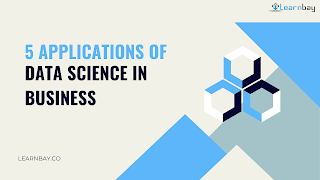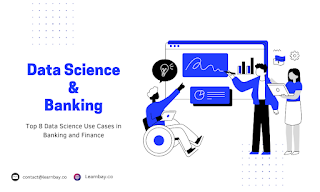Data Science: What Is It? 5 Business Applications
Data Science
Data science is the process of creating, cleaning, and structuring databases for analysis and meaning extraction. This should not be confused with "data analytics," which is the act of analyzing and comprehending data. Both of these procedures are useful in business and have many similarities.
For data science, you must:
Create hypotheses
Conduct tests to acquire information
Analyze the data's quality
tidy, well-organized datasets
Data should be structured and organized for analysis.
Data scientists frequently write algorithms in coding languages like SQL and R to collect and analyze enormous amounts of data. Algorithms may spot facts or patterns that people overlook if they are properly developed and carefully tested. Data scientists commonly write algorithms in coding languages like SQL and R to collect and analyze enormous volumes of data. You can master programming and other tools with the help of data science training in Bangalore.
Here are five data science tools your company may use if you want to make sense of large data sets and use them to make a difference.
5 DATA SCIENCE APPLICATIONS IN BUSINESS
Gain Customer Insights
Data about your clients may provide information on their routines, demographics, tastes, goals, and more. Fundamental data science knowledge may help make sense of the numerous potential consumer data sources.
For instance, you may compile information about a consumer each time they go to your website or physical store, add anything to their basket, make a purchase, read an email, or interact with a social media post. You must integrate the data in a procedure known as "data wrangling" after ensuring the information from each source is valid. This might entail cross-referencing customers' email addresses with their social network names, payment card details, and purchase identifications. By combining the data, you can draw conclusions and spot patterns in their behavior.
Knowing who your consumers are and what drives them will help you guarantee that your product fulfills their needs and that your marketing and sales initiatives are successful. Retargeting strategies, customized experiences for certain customers, and enhancements to the user experience of your website and product may all benefit from having access to and understanding trustworthy consumer data.
Increase Security
Data science may also be used to improve corporate security and protect sensitive data. Banks, for instance, utilize advanced machine learning algorithms to spot fraud by looking for changes in a user's typical financial behavior. These algorithms can identify fraud more quickly and precisely than individuals because of the vast quantity of data gathered daily.
Even if you don't work for a bank, algorithms may be used to encrypt sensitive data and secure it from prying eyes. Understanding data privacy can assist you in preventing your company from improperly utilizing or revealing sensitive client data, including contact information, Social Security numbers, credit card numbers, and medical and financial data.
Tingley writes in Data Science Principles, "As businesses grow more and more data-centric, the requirement for ethical management of individual data becomes equally critical."
Businesses may get closer to a higher degree of security and ethical data usage with the help of a combination of algorithms and human judgment.
Inform Internal Finances
The finance staff at your company may use data science to produce reports, make projections, and examine financial patterns. Financial analysts can manually or automatically discover trends in financial growth or decline using data on a company's cash flows, assets, and debts.
You may apply predictive analysis if you're a financial analyst charged with forecasting revenue. To do this, you would need to multiply the projected sales volume for the next period by the forecast average selling price per unit. Finding patterns in validated, cleaned, and organized historical business and industry data will enable you to forecast both the average selling price and the anticipated number of units sold.
A risk management study may also be used to determine whether the possible drawbacks of a particular company's choice are worth it.
Streamline Manufacturing
Finding inefficiencies in manufacturing processes is another approach to applying data science to business. High amounts of data are collected from industrial operations by manufacturing equipment. An algorithm may be created to rapidly and correctly clean, organize, and analyze large amounts of gathered data that are too complex for a human to evaluate manually.
For instance, a machine-learning program called Golden Run was created by the industrial automation company Oden Technologies to collect data from factories, identify periods of high production, and provide recommendations for reproducing those peak productivity moments. As more data is acquired, the system develops more effective suggestions for improvement. Businesses may decrease costs and boost output by implementing data science to improve efficiency.
Predict Future Market Trends
You can spot new trends in your industry by gathering and studying data on a larger scale. What items individuals are interested in may be determined by monitoring purchase data, celebrities and influencers, and search engine searches.
As an example, upcycling clothing is gaining popularity as a way to update a wardrobe while being environmentally conscious. 81 percent of customers, according to Nielson research, strongly agree that businesses should do their part to protect the environment. The clothing store Patagonia, which has been using recycled plastic polyester since 1993, established Worn Wear, a website that allows people to cash in on this expanding trend by repurposing pre-owned Patagonia items.
You may make business decisions that help you get ahead of the curve by staying current on the habits of your target market.
Conclusion
Data may provide insights, direct efficiency efforts, and inform forecasts when combined with critical thinking and machine-learning algorithms. Understanding how to certify data sources, organize and clean data, and extrapolate results may be useful skills in your work, even if you aren't a data scientist. On the other hand, these data science professionals are valuable for many companies to thrive. So if you’re a data science aspirant looking to upgrade your skills, join India’s best data science course in Bangalore, learn the in-demand tech skills and get high-paying jobs in top MNCs.




Comments
Post a Comment